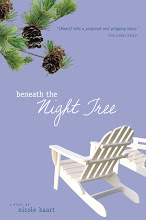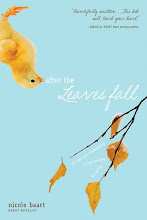
In my last post I admitted that I'm a bookaholic. A book worm, a word junkie, a literary addict. I was the nerdy girl in high school who tripped over her own two feet because her nose was buried in a book. Wish I could tell you that I was cool and athletic, the perfect Renaissance woman with an eye for art and a wicked hook shot, too. But that would be a terrible lie.
For me, books are relaxing, entertaining, fun, challenging, inspiring... The list goes on. But I have to admit that books are also perplexing. Or, at least, they can be.
If you've ever visited my Goodreads profile, you may have seen that I've rated 46 books and my average rating is 4.50. Apparently I like a lot of books! A rating of 4.50 means that I really liked it or I thought it was amazing. Am I just a kind reviewer? Nah, I think the truth of the matter is that I inherently know within the first few pages of a book whether or not I want to read it. The ones that don't hold my interest I simply abandon. That's why although I love to buy books, I'm very careful to read the intro before I put my money down.
So what happens when I finish a book and don't like it? I feel terrible. Really, I do. It's strange, I know, but I have a theory on this too... I believe that art is, at its deepest root, a conversation. The artist has something to say and she longs for an audience to hear it. So she writes, paints, makes music, whatever, and sends it out into the world in the hope that someone will read it, see it, hear it and say: "Yes. I get this. It touches me." And when I read a crappy book, I feel like there's been some sort of miscommunication. I want to email the author and say, "Let's talk about this. What were you trying to do here that I missed?" Okay, it's not always that extreme, but twice in the last little while I've had this experience and it bugs me.
Recently I've read two books that, let's be honest, I very much disliked. One is climbing the bestseller charts and receiving amazing reviews--I thought it was obnoxiously sentimental, poorly written, and terribly plotted. Oh, and I hated the ending. The other got a starred review from Publishers Weekly and is considered by many to be a literary masterpiece--I had no connection whatsoever to the characters, didn't believe the story arc, and went batty from all the overused words (How many times can you use ubiquitous in two pages? Four apparently.) And every time I see another rave review, I can't help wondering: What's wrong with me? Why did I hate this book when the rest of the world thinks its better than warm creme brulee? Is it all just a matter of taste? Or did I miss something? Of course, there are just plain bad books out there... Maybe I'm making too much of it.
Oh, that was cathartic. I can't bring myself to write a bad review (my mom always said if I didn't have something nice to say I shouldn't say anything at all!), but I hated those books and it feels good to say so. Now it's your turn. Have you ever read and hated a book? You don't have to disclose the title if you don't want to, but I'll throw out another book that I thought stunk: The Da Vinci Code. It was entertaining but nearly impossible for me to read because I thought the prose was so terrible. Dan Brown has made millions off it so I don't think he'll care too much that little old me wasn't impressed. And if he does care: I'm sorry. I didn't mean to hurt your feelings. I'm sure you're a wonderful person. ;) Whew. Old habits die hard.










i am a reader, too. i forgot to post on the last post you did, but i always have been. when i was little, my mom used to ground me from reading when i was in trouble because she learned that when she would send me to my room to be grounded, i would just lie down and read for hours! i literally will read for hours every day if i can. (not that i have the time, but usually an hour a day).
ReplyDeletei am actually very similar to you! i generally LOVE a book or hate it. my goodreads profile has a pretty high average rating too :). but the difference between us is that i generally don't stop reading a book if i start to not like it. i can think of two books that i started and stopped 100 pages in because it either didn't make a lick of sense or was just ridiculous or something. i always think "if i just keep reading, it will get better!" generally i'm rewarded with a good book, only occasionally do i not enjoy it. that is also why i have so many books....i keep them so i can read them again!
(by the way, this is stacey duncan...i just got a new blog for my photography business!)
Hi Stacey! Nice to hear from you. You probably have a better approach when it comes to "bad" books, but I just don't have the patience. Unless someone I know and trust has recommended it...
ReplyDeleteI didn't know you were a photographer. I can't wait to check out your site!
Blessings,
Nicole
There are a lot of YA books that I don't like. I read Do You Know the Monkey Man to my students because they begged me to. But wow, I really struggled reading this one to them. It just was not well written.
ReplyDeleteLately, I've been starting a lot of books and not finishing them. I'm having a hard time getting into anything. I tried reading Jody Picoult's book... oh jeesh, I can't even remember the title. It's about heart stuff and death row. I stopped on page one hundred. At first I was liking it, but now I just don't get it at all. But obviously she's an amzing author because everybody and their mother loves her books.:)
I sort of feel like I'm opposite of you. I'm picky when it comes to books. There aren't a ton that I rave about. So when I find one, it really pumps me up!
Katie, that only makes me more excited that you liked my book! ;) I'm honored.
ReplyDeleteOoh, and I forgot to say, stay tuned tomorrow. I review a pair of books that I just love. Maybe you can add them to your reading list!
ReplyDeleteI teach history and theology, so I most of the books I read fall under these themes. It is hard to be thoroughly disappointed in a book in these genres b/c, even if the book is rather poorly done or I don't like the direction of the author, there is something to be learned and used in a lecture, article, etc.
ReplyDeleteFiction is another matter. Over the last few years I've started reading novels. I started with Charles Dickens and loved his works. This year I read two newer novels and was disappointed in both. One had a plot and conclusion, but lacked a "so what?" The other one, highly touted as a Christian novel, left me wondering, "What was that all about?" Yes, I felt I wasted time.
When I read a novel I want to feel the emotions, turmoil, joys, etc. of the characters. Dickens does that for me. I remember his character Pip (at least I think that was his name) being rejected by a pretty girl when he was a teenager. He leaned up against a house and cried. He wondered, "Why do we cry? What makes us lose control?" Then he analyzed the hurts and bruises to our soul that makes us pain. I had similar experiences and almost cried along with him. At the conclusion of the book I sat there and thought, "Wow, where could this lead now? What would the sequel look like?" When I feel that response at the end of a novel, I will likely read it again and will recommend it to others. It will also turn up in lectures, sermons and articles that I write!
I fully agree with you on Dan Browns "The Da Vinci Code." I thought it was interesting, but the characters were poorly developed and the prose was awful. (I have a review of this book on Amazon). Too many modern fiction authors rely upon sensation, sex or violence, in their work rather than developing believable characters. As a consequence, their work seems frivolous and fluffy, very unsatisfying.
Good post here, Nicole, got me thinking!
Thanks for sharing your thoughts, Warren. I'm a huge Dickens fan--"A Tale of Two Cities" remains my all-time favorite book. I re-read it once a year.
ReplyDeleteAs for modern authors sensationalizing their work, I think sometimes they/we feel like there's no other choice. Who's going to read my puny little book when there are (quite literally) a million+ others to choose from? It's hard not to sell out and write something that's sure to be noticed. But I think the mark of a truly great author is honesty--Does he/she write what with integrity and a genuine artistic passion for the subject at hand? That's what I loved about Dallas and Epstein's books (reviewed in the next post). Both of these women love their characters, their setting, their story. It's real and honest and captivating.
Thanks for the dialogue!